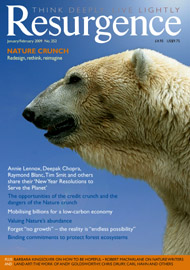THE CREDIT CRUNCH has shaken the stock markets and banks around the world but according to George Monbiot, “This is nothing.” He says that this crisis is petty compared to the crisis of the ‘Nature crunch’.
The credit crunch and the Nature crunch are related. Excessive greed for limitless profit, and reckless lending and spending are the causes of the credit crunch. We are doing the same with Nature. The greedy squandering of natural capital is risking the integrity and sustainability of the Earth itself, which is causing the Nature crunch. Unregulated free-market financial systems encourage irresponsible speculation, unmanageable debt, rampant consumerism and the colossal waste of Nature’s gifts.
Banks, stock markets and all our financial transactions are supposed to be in the hands of highly educated, smart people who claim to be intelligent realists. So how have they managed to bring the whole system to the brink of disaster? Why do they have to go to the government cap in hand, begging to be bailed out?
The answer is staggeringly simple. They have confused money with wealth. They have failed to recognise that money is not wealth; money is only a measure of wealth and a means of exchange. Real wealth is good land, pristine forests, clean rivers, healthy animals, vibrant communities, nourishing food and human creativity. But the money managers have turned land, forests, rivers, animals and human creativity into commodities to be bought and sold. Even money itself has become a commodity as speculators trade in money to make more money.
Money is a good invention as a means to an end but it should not become an end in itself. We buy and sell houses, forests, foods and land to make money. And we buy and sell money to make money. Almost everything has become a commodity. It has become acceptable to engage in any kind of trading as long as it makes money. Over 80% of the money whirling around the world, day and night, is unrelated to goods or services or to any kind of real wealth. Money, which was a means to trade, has been turned into a status symbol, a source of power and prestige. This false philosophy of money is the root cause of the credit crunch and it leads to the Nature crunch.
The Nature crunch is not something in the distant future: melting ice caps and climate chaos are already with us and that is because of our obsession with making money at all costs. We are over-fishing our oceans to make money, clear-cutting the rainforests, poisoning the land with chemical fertilisers, herbicides and pesticides, putting animals in factory farms, manipulating seeds with genetic engineering; the list goes on – and all this merely to maximise money. We are prepared to let Nature suffer but not prepared to slow down the pace of money growth.
Of course money has a place within the broad context of sustainability and a harmonious relationship with the natural world, but we have to put it in its place and keep it there, rather than allow it to dominate our lives to such an extent that the human community as well as the Earth community is endangered.
THE CURE FOR the credit crunch and the Nature crunch is to put ecology before economy but at present the economy is paramount and ecology is ignored. Recently I was invited to speak at the London School of Economics (LSE). I asked my hosts, “You are a well-known university teaching about the economy but where is your Department of Ecology?” They replied, “We do teach environmental studies but we do not have a Department of Ecology, as such.”
Now, the study of the ‘environment’ is not the same as the study of ‘ecology’. The environment is what surrounds us humans. This implies that humans are at the centre and what is around us is our environment. So ‘environment’ is an anthropocentric concept whereas the word ‘ecology’ is more inclusive. Ecology implies relationships between all species, humans and the natural world.
Ecology and economy are derived from three Greek words: oikos, logos, nomos. ‘Oikos’ means home: a place of relationships between all forms of life, sharing and participating in the evolution of the Earth community. ‘Logos’ means the knowledge of our planet home, and ‘nomos’ means management of that home.
Now what is taught at the LSE is economy; management of the home, and not ecology, the knowledge of home. How can anyone manage something they know nothing of? If you don’t know your living room, bedroom, dining room, kitchen or garden how are you going to manage them? If you don’t really know your mother, father, husband, wife or children, how are you going to manage those relationships?
So ecology should come before economy; knowledge before management. But at the LSE, as well as at most other universities, the study of the economy dominates. These universities are sending thousands upon thousands of young people into the world equipped with management skills but without knowledge of what they are going to manage. These graduates are half-educated, which is worse than being uneducated.
TOGETHER WITH ECOLOGY and economy we need a third ‘E’: ethics. Our ‘oikos’, our planet home, has to be built on the firm foundation of ethical and spiritual values. Without such a foundation our home will be unstable and unsustainable. The credit crunch as well as the Nature crunch offer us a challenge and an opportunity to redesign our money system and our economies in such a way that we can restore the wellbeing of the human community as well as the Earth community.
E.F. Schumacher’s well-known essay on Buddhist Economics and his book Small is Beautiful should be read again and again. He embraced a vision of economics where people and planet mattered and where ethical and spiritual values underpinned economic values. In this issue David Cadman offers an updated version of the same vision. Frugality, simplicity and restraint are the urgent imperatives at these critical times. If we are caring and generous to Nature, Nature will reciprocate. Mahatma Gandhi said, “There is enough in this world for everybody’s need, but not enough for anybody’s greed”.
SATISH KUMAR







